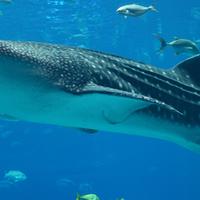Whale Sharks – level 3
Walhaie – Stufe 3
Καρχαρίες φάλαινες - επίπεδο 3
Whale Sharks – level 3
Tiburón ballena - nivel 3
Requins-baleines - niveau 3
Squali balena - livello 3
ジンベイザメ–レベル3
고래 상어 - 레벨 3
Rekiny wielorybie - poziom 3
Tubarões-baleia - nível 3
Китовые акулы - уровень 3
Balina Köpekbalıkları - seviye 3
Китові акули - рівень 3
鲸鲨——3级
鲸鲨 - 第 3 级
Scientists are diving into the waters around the Galapagos Islands to gather more information about the whale shark.
||tauchen|||||||||||||||
||||||||Galapagos Adaları|||||||||
|||||||||||recolectar||||||
|||||||||||collect||||||
科学者たちは、ジンベイザメに関する詳細情報を収集するために、ガラパゴス諸島周辺の海域に飛び込んでいます。
科学家们正在潜入加拉帕戈斯群岛周围的水域,以收集有关鲸鲨的更多信息。
Whale sharks are the largest found in the world's oceans, but they are also one of the least understood, with some scientists calling them a mystery species.
|||||发现的|||||||||||||||||||||
|||||||||||||||||||in that|||||||
|||||||||океанах|||||||||||||||||
|||||||||los océanos|||||||||||||||||
Walhaie sind die größten Tiere in den Weltmeeren, aber sie gehören auch zu den am wenigsten erforschten Arten und werden von einigen Wissenschaftlern als geheimnisvolle Spezies bezeichnet.
El tiburón ballena es el más grande de los océanos del mundo, pero también uno de los menos conocidos. Algunos científicos lo consideran una especie misteriosa.
ジンベイザメは世界の海で見つかった最大のものですが、最も理解されていないものの1つでもあり、一部の科学者はジンベイザメを謎の種と呼んでいます。
Китовые акулы - самые крупные, обитающие в океанах мира, но они также одни из самых малоизученных, некоторые ученые называют их вида тайной.
鲸鲨是世界海洋中发现的最大的鲨鱼,但它们也是人们了解最少的鲨鱼之一,一些科学家称它们为神秘物种。
The animal can weight up to 18 tonnes and its size ranges from 6 to 16 metres in length.
||||||Tonnen||||Größenbereiche|||||
||||||тонн|||||||||
||||||toneladas||||varía|||||
El animal puede pesar hasta 18 toneladas y su tamaño oscila entre 6 y 16 metros de longitud.
動物の体重は最大18トンで、体長は6〜16メートルです。
Этот животное может весить до 18 тонн и его размер варьируется от 6 до 16 метров в длину.
这种动物的体重可达 18 吨,体长从 6 米到 16 米不等。
Despite the size, these sharks are gentle giants and only eat tiny fish and plankton.
|||||||巨型|||||||
||||||sanfte||||||||
||||||||||||||microscopic organisms
|||||||великани|||||||
a pesar de||||||||||||||
A pesar de su tamaño, estos tiburones son gigantes amables y sólo comen peces diminutos y plancton.
サイズにもかかわらず、これらのサメは穏やかな巨人であり、小さな魚とプランクトンしか食べません。
Несмотря на размер, эти акулы - мягкие великаны и питаются только мелкими рыбками и планктоном.
尽管体型巨大,但这些鲨鱼却是性情温和的巨型动物,只吃小鱼和浮游生物。
Scientist Alex Hearn explained that there is a whole proportion of the population that scientists do not have much access to and would like to find out more about the shark's sexual maturity, mating, pupping ground, mortality and early life stages.
|||||||||比例|||||||||||||||||||||||成熟||||死亡率||||
||Hearn|||||||Anteil|||||||||||||||||||||||reife||Wurfstätte||Sterblichkeit||||Lebensphasen
|||||||||segment|||||||||||||||||||||shark's sexual maturity||sexual maturity||||death rate||||
||Hearn(1)|||||||proporción||||||||||||||||||||||sexual||apareamiento|nacimiento de crías||mortalidad||||etapas tempranas
Der Wissenschaftler Alex Hearn erklärte, dass es einen ganzen Teil der Population gibt, zu dem die Wissenschaftler nur wenig Zugang haben, und dass sie mehr über die Geschlechtsreife, die Paarung, den Welpenplatz, die Sterblichkeit und die frühen Lebensstadien der Haie herausfinden möchten.
El científico Alex Hearn explicó que hay toda una proporción de la población a la que los científicos no tienen mucho acceso y que les gustaría averiguar más sobre la madurez sexual del tiburón, el apareamiento, la zona de cría, la mortalidad y las primeras etapas de su vida.
科学者のアレックスハーンは、科学者があまりアクセスできない人口の全体の割合があり、サメの性的成熟、交配、子育て場、死亡率、初期のライフステージについてもっと知りたいと説明しました。
Ученый Алекс Хирн объяснил, что есть целая часть популяции, к которой у ученых нет большого доступа, и они хотели бы узнать больше о половой зрелости акулы, спаривании, месте размножения, смертности и ранних стадиях жизни.
科学家亚历克斯·赫恩(Alex Hearn)解释说,有很大一部分鲨鱼种群是科学家无法接触到的,他们希望更多地了解鲨鱼的性成熟、交配、幼崽场、死亡率和早期生命阶段。
It is also really important to understand the migratory patterns of the species if scientists wish to protect them in a meaningful way.
||||||||迁徙|迁徙模式|||||||||||||
||||||||Wander-|migratorischen Muster||||||||||||sinnvollen|
||||||||migrating||||||||||||||
||||||||migratorios|||||||||||||significativa|
Es ist auch sehr wichtig, die Wanderungsmuster der Arten zu verstehen, wenn Wissenschaftler sie sinnvoll schützen wollen.
También es muy importante comprender las pautas migratorias de las especies si los científicos desean protegerlas de forma significativa.
科学者が意味のある方法で種を保護したい場合は、種の移動パターンを理解することも非常に重要です。
Также очень важно понять миграционные модели видов, если ученые хотят защитить их значимым образом.
如果科学家希望以有意义的方式保护它们,那么了解该物种的迁徙模式也非常重要。
Difficult words: species (an animal kind), tiny (very small), plankton (very small organisms in the water), proportion (a part), pupping ground (the area where the sharks have their pups – baby sharks).
||||||||||||||||proporción||||||||||||||
難しい言葉:種(動物の種類)、小さい(非常に小さい)、プランクトン(水中の非常に小さい生物)、比率(一部)、子犬の地面(サメが子犬を飼っているエリア-赤ちゃんサメ)。
You can watch the video news lower on this page.
このページの下部にあるビデオニュースを見ることができます。
您可以在本页下方观看视频新闻。

